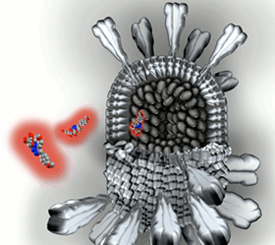New antiviral could 'starve' killer coronaviruses
Release Date 03 October 2014

A team of scientists at the University of Reading have developed a unique antiviral which could one day be used to fight deadly viruses such as MERS.
The researchers compared mouse coronavirus which was treated with the new compound to another sample that was untreated. Over a period of two weeks the virus on its own made around 10 million new viruses. However the virus with the new compound only made around 10 viruses.
Although the researchers aren't exactly sure how the antiviral works, it's thought it forms a shield inside the cell cutting of the virus' ‘food supply' - products of enzymes found inside cells. The cells suddenly became very inhospitable for the coronavirus which eventually ‘starves' and dwindles away.
Unlike most successful antivirals which specifically attack the virus, this could be the first to directly protect the cells in our bodies.
Coronavirus is one of the world's most dangerous virus groups and includes SARS and MERS. The 2002-2003 SARS outbreak killed over 750 people across the globe while MERS, a relatively new coronavirus, has claimed nearly 200 lives. There are currently no licensed antiviral drugs for coronaviruses. The researchers believe their novel method could lead to an answer.
Dr Andre Cobb, from the University of Reading's School of Chemistry, Food and Pharmacy, developed the compound and is lead author of the study. He said: "This is an exciting step in the fight against viruses such as MERS. Coronaviruses depend on a steady supply of building blocks, RNA compounds, from our cells to infect our bodies. We developed a number of compounds to see if any could stop the coronavirus from being able to feed off the enzymes inside the cell."
University of Reading virologist Dr Ben Neuman then tested the new compound to see what effect it would have on coronavirus.
Dr Ben Neuman said: "The new compound caused something quite unexpected to occur. Usually over a two week period the virus would change to become more resistant to the drug. This didn't happen - the drug worked just as well as it did originally. This suggests that it may work by slowing down some of the many RNA-making enzymes in the host cell - effectively starving the virus."
The researchers stressed that there is a long way to go before an antiviral drug which targets coronaviruses successfully is developed.
Dr Cobb added: "2014 has seen MERS return for the third straight year. It's likely it will reappear in 2015, perhaps as a more virulent strain. As the current Ebola outbreak has highlighted, the development of new antiviral drugs and effective vaccines is a controversial, complicated and costly issue. However, our research offers a possible new drug development route for pharmaceutical companies, to tackle what is a dangerous and emerging group of viruses."
Synthesis and Antiviral Properties of Spirocyclic [1,2,3]-Triazolooxazine Nucleosides is published in Chemistry - A European Journal
